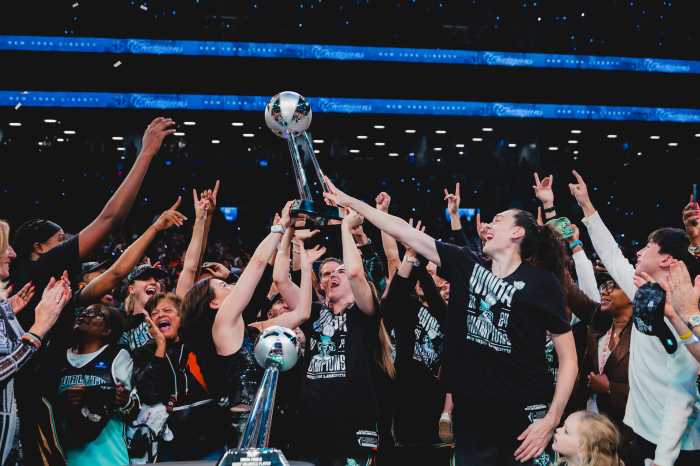CANNES, France – It’s called the Cannes
International Film Festival, but sometimes it’s difficult to
find people who are actually there to see films.
In fact, the Cannes festival serves a number of functions, movie
stars climbing the red-carpeted staircase to the films in competition
being only a small piece of the pie.
For many, the real business of the festival is business – selling
films to distributors, searching for partners for that next venture,
even the exchange of ideas. The Cannes market is the section
that facilitates all of this.
Given this, there are many folks who never see the inside of
a theater or a screening room during the festival. I found two
such specimens at the festival this year, both native Brooklynites.
Born in Flatbush and now living in Brooklyn Heights, Michelle
Byrd is the executive director of the Independent Feature Project,
a not-for-profit organization of directors, screenwriters, producers,
distributors and festival programmers known for its annual September
event, the Independent Feature Film Market. Byrd joined the Manhattan-based
IFP staff in 1990, and has been executive director for five years.
For years IFP has partnered with Variety at the film festival,
hosting a number of panels, receptions and seminars. Last year,
at the urging of market officials, Michelle and the IFP established
a booth. The IFP serves as an umbrella organization under which
independent American filmmakers – this year 110 of them – can
sign up for the market and network with more ease and less money
than if they had come solo.
In addition, the IFP continues to present a number of events
with Variety. This year, Byrd and her group hosted a press conference
with American directors, and a panel on film financing – so popular
that "LA Confidential" director Curtis Hanson was spotted
in the standing-room-only audience. And American stars that may
also be independent filmmakers – like Faye Dunaway – look to
the IFP during the Cannes festival for help and guidance.
Needless to say, Byrd’s days at the festival are not filled with
screenings. Although she tries to catch as many films as possible
– the better to be conversant in the industry – this year, she
was not so lucky.
"I didn’t see one film!" Byrd bemoaned. Her days were
typically filled with meetings with various international film
institutions, such as European Film Promotion, in order to forge
relationships for future partnerings. All hard work, to be sure,
but the IFP fills a much-needed void for American independent
filmmakers (who don’t have the national film boards or commissions
that other countries have to support their work) both at Cannes
and at home.
The winners are
We should devote a bit of space to the films of the Cannes Film
Festival, so here’s an awards recap. The Palme d’Or – the festival’s
top prize – went to Italian filmmaker Nanni Moretti’s "The
Son’s Room." (A retrospective of Moretti’s previous films
is currently playing at the BAM Rose Cinemas.)
But the directing prize was shared by two Americans – David Lynch
for his long-awaited "Mulholland Drive," and Joel Coen
for his latest effort, "The Man Who Wasn’t There" (with
a cast that includes Billy Bob Thornton, Frances McDormand and
James Gandolfini as well as Park Slope resident Katherine Borowitz.
She’s made a few appearances at the festival, including 1998’s
"Illuminata," directed by and costarring her husband,
John Turturro.)
The film that garnered the most prizes was Michael Haneke’s "La
Pianiste" ("The Piano Teacher"). The film took
the Grand Prize, which is the runner-up to the Palme d’or. The
two leads, Isabelle Huppert and Benoit Magimel, won both acting
awards.
The Camera d’Or, which is the prize for the best first feature-length
film, went to Canadian filmmaker Zacharias Kunuk for his epic
film, "Atanarjuat the Fast Runner."
Now let’s see which of these films will make it to our cinemas
first – that, of course, is being optimistic and assuming that
all of the foreign films will get U.S. distribution. Talks concerning
distribution certainly began in the halls of the Cannes market,
so we’re back to the market again.
GAZM.org
Park Slope resident Jacob Shwirtz was a very busy lad at the
market. He just graduated from Brooklyn College June 1, but before
that he was at the Cannes festival, networking for his 2-year-old
company, GAZM.org, an interactive platform enabling users to
share their knowledge and opinions about film, music and culture.
The topics on the site seem unlimited and include, of course,
creating your own site. "Constant intellectual stimulation"
is the tag line. Shwirtz also refers to it as a playground for
the mind. This upstart startup also provides marketing and market
research to major entertainment companies.
But why attend the Cannes market for a Web site? Easy. Shwirtz
and his colleagues are always looking for partnerships with different
companies; they’ve been working with New Line Cinema as well
as 20th Century-Fox, so coming to a film festival to make new
contacts seems like a smart move.
And it was for Shwirtz.
He did in fact, find new investors for his company – a nice couple,
as he put it, that he met at Cannes last year. He liked them,
they liked him, they went out to lunch during the festival this
year, and voila – a connection.
This is Shwirtz’s third year at the festival. The two previous
years he worked as a computer technician at the American Pavilion
by day, and got the lay of the land by night. So much so that
this year, when he signed on with the market and brought five
other colleagues with him, he knew exactly what he needed – and
wanted – to do.
He held a small cocktail party at the Market Club (one of many
sites for entertaining at the festival), with champagne donated
by the club, "because the head of the place liked me, I
guess," Shwirtz admitted.
And this may be why he’s still in business. You have to wonder,
with all those dot-coms crashing and burning, why GAZM.org is
still going. (Last year, there seemed to be people hawking their
Web sites on every corner; this year, most of them were gone.)
"There’s nothing wrong with bad companies going out of business,"
he said. (He didn’t want to sound arrogant, he said. But he didn’t
– I knew what he was talking about). Living – and working – in
the house he was born in, Shwirtz is very careful with his company.
He manages to keep costs low, with database engineers in Egypt
and animators in Croatia.
He also manages his time carefully at the festival. Parties?
Not really, he said. He got over the party factor in his first
two years here.
"After a while you realize the parties are all the same.
If you have to wake up early the next morning for a meeting,
you want to get to bed early the night before," he says.
A lot of Shwirtz’s meetings are in the morning, so socializing
is selective. If there are networking possibilities, well, that’s
another story.
"It’s work!" he says. And so it is. But it seems to
be an energizing sort of work for him. "Everyone is very
approachable in Cannes," he says, because you never know
who that person will turn out to be.
So, did he see any films at the festival this year?
"I saw one, the first day," Shwirtz said. It was a
film only being shown in the market (that is, not in any of the
official festival programs) made by some people he met on the
flight over. But then it was back to work.
That’s how it is for everyone – work in the cinemas, work on
the beach, maybe work on a yacht. I promise you, it is work,
but you won’t catch either of these Brooklynites complaining.
They’ll be back at it again next year.























